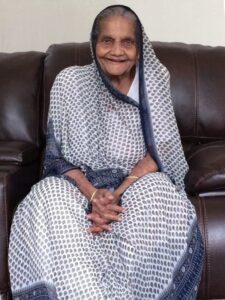“I lost my wonderful, charming and beautiful grandmother (Baa*) aged 95.
She died of a very rare condition called acute ischaemic bowel.
A wife, mother to eight, grandmother to 20, and a great-grandmother to 22 children.

Prinal’s Grandmother, Kamlaben
Baa was very kind and hardworking, nothing was ever too much for her and she was a great pillar of the community.
Baa displayed her love and compassion not just for her family, but all those that she came across.
She was adoring and positive, and just the sight of her smile was enough to make us all happy.
I had just finished a day of wedding planning meetings (here in the UK), when my sisters called to say my grandmother has been rushed to hospital in Chicago after being found unconscious at home.
Mum and I were constantly on FaceTime, eagerly awaiting positive news from the doctors. Unfortunately consultants advised us to inform all immediate family.
Mum and I raced to the airport getting the next flight out to Chicago. In flight, every minute felt nearly an hour long, constantly on edge as to whether we would make it in time.
The moment we landed we raced to the hospital. Her beautiful smile still greeted us even in her moments of pain. That very evening she was sedated and intubated to help her breathe.
The following morning, we faced the toughest decision of our lives.
We spoke with every doctor involved in her case (seven of them), followed by a further five doctors in the hope that one of them would tell us there a chance of her surviving.
Not a single one had the news we wanted to hear.
As her skin turned black due to high dose medications, we made the decision to let her find peace. Her ICU room was filled with 18 of us immediate family, holding onto her as she took her last breath.
Our family has made peace with her leaving us. She lived 95 amazing years. BUT we only wish she went without any pain.
Having witnessed first hand the pain and devastation mesenteric ischaemia can cause, Prinal was determined to raise funds for more research into better treatments, and to raise awareness of how to spot the signs earlier.
She took on the Virgin London 10k, raising £752.89 for our work.

Prinal at the finish line
Together – Prinal and BRUK – we want to spread the word about mesenteric ischaemia so that people know about this deadly condition.
This is a condition in which the blood flow to the bowel is restricted, either partially or completely. The mesentery is a sheet of tissue through which run the blood vessels that supply the bowel. There are two main types: chronic and acute mesenteric ischaemia. Chronic mesenteric ischaemia happens when the arteries supplying the small intestine become narrowed by disease – so called ‘hardening of the arteries’ or atherosclerosis.
This can cause pain after eating, in a similar way to cardiac angina causing chest pain during exercise, and weight loss as patients avoid eating due to the pain. Chronic ischaemia may be difficult to spot; it is uncommon, and the some of the symptoms are also caused by other, less serious, conditions.
Acute mesenteric ischaemia happens when the blood supply to the bowel is suddenly obstructed entirely.
Patients – like Prinal’s grandmother – become seriously ill very quickly so that by the time they arrive at hospital, it is often too late for effective treatment, and the likelihood of survival is low. Chronic mesenteric ischaemia can of course develop into the acute form, much in the same was as narrowed coronary arteries can lead to coronary thrombosis.
We asked Matt Lee, Clinical Research Fellow in General Surgery at Sheffield Teaching Hospitals NHS Foundation Trust, about how tough mesenteric ischaemia is to treat, and the need for more research:
“Acute mesenteric ischaemia presents many challenges for clinicians and patients. Doctors must have a high index of suspicion for this condition in order to do the right tests and take the right decisions to allow timely treatment. The biggest challenge is diagnosis as we don’t have a bedside test specifically for this condition. With a test like this we could intervene early and potentially make a massive difference to patients. I think this is an area where we should look to fund research.”
At BRUK, funding more research to help treat bowel problems of all kinds is exactly what we do.
Through the support of people like Prinal, we can do this and one day make the sort of massive difference Matt is talking about.
So please share this post – and consider a donation to BRUK to help us fight for improved care & treatment.
*Baa is Gujarati for Grandmother
